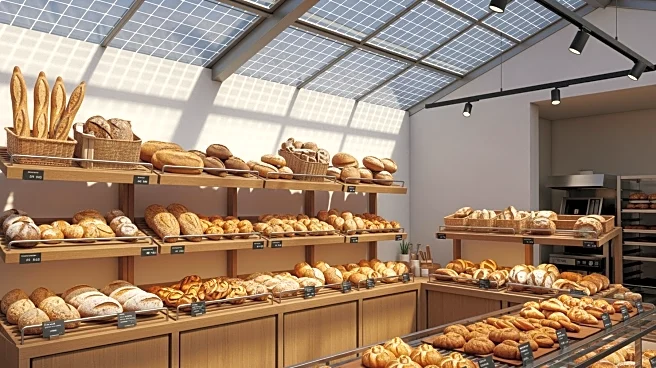What's Happening?
Premier Foods has completed a significant solar energy project at its Carlton Bakery in Nottinghamshire, UK, investing £2.1 million in a 2.2MW solar farm. This installation, which spans 2.9 hectares and
includes 3,500 solar panels, is designed to generate up to 75% of the bakery's electricity needs during peak production times. The project is part of Premier Foods' broader sustainability strategy, the Enriching Life Plan, which aims to reduce carbon emissions and enhance energy resilience. The solar farm is expected to cut annual carbon emissions by 468 tonnes and has the potential to export surplus electricity back to the local grid. This initiative is one of several across Premier Foods' sites, including additional solar systems at Stoke and Ashford, aimed at improving operational efficiency and advancing net-zero goals.
Why It's Important?
The investment in solar energy at Carlton Bakery represents a significant step towards sustainability in the food manufacturing sector. By reducing reliance on external energy sources and cutting carbon emissions, Premier Foods is not only enhancing its environmental credentials but also strengthening its operational resilience. This move aligns with global trends towards renewable energy adoption, which is crucial for meeting climate targets and reducing the carbon footprint of industrial operations. The project also supports local biodiversity through a ten-year plan developed with ecology experts, demonstrating a commitment to environmental stewardship. As industries face increasing pressure to adopt sustainable practices, Premier Foods' initiative could serve as a model for others in the sector.
What's Next?
Premier Foods plans to continue its sustainability efforts by rolling out similar solar projects at other sites. The company is likely to monitor the performance of the Carlton Bakery solar farm closely to assess its impact on energy costs and carbon emissions. The success of this project could encourage further investments in renewable energy across the company's operations. Additionally, the integration of biodiversity plans suggests a long-term commitment to environmental enhancement, which may lead to further collaborations with ecological experts. Stakeholders, including local communities and environmental groups, may respond positively to these initiatives, potentially influencing other companies to adopt similar strategies.
Beyond the Headlines
The Carlton Bakery solar project highlights the intersection of industrial operations and environmental responsibility. By investing in renewable energy, Premier Foods is addressing both economic and ecological challenges, setting a precedent for sustainable business practices. The potential to export surplus energy to the local grid not only benefits the company but also contributes to the community's energy resilience. This initiative reflects a growing recognition of the need for businesses to play a proactive role in combating climate change and supporting local ecosystems. As more companies follow suit, the cumulative impact could drive significant progress towards global sustainability goals.











